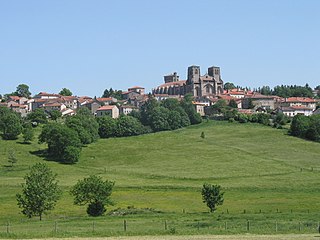
Christian Georges Cziffra was a Hungarian-French virtuoso pianist and composer. He is considered to be one of the greatest virtuoso pianists of the twentieth century. Among his teachers was Ernő Dohnányi, a pupil of István Thoman, who was a favourite pupil of Franz Liszt.

La Chaise-Dieu is a commune in the Haute-Loire department in south-central France. Its inhabitants are called Casadéens, from the Latin name of the city.

Jean-Philippe Henri Collard is a French pianist known for his interpretations of the works of Gabriel Fauré and Camille Saint-Saëns.
Jean-Claude Vannier is a French musician, composer and arranger. Vannier has composed music, written lyrics, and produced albums for many singers.

Romain Hervé is a French classical pianist.

François Goetghebeur is a French film director, photographer and art director. He became known in the music world thanks to his work including music videos, recordings, documentaries and artists portraits.

Music in the city of Paris, France, includes a variety of genres, from opera and symphonic music to musical theater, jazz, rock, rap, hip-hop, the traditional Bal-musette and gypsy jazz, and every variety of world music, particularly music from Africa and North Africa. such as the Algerian-born music known as Raï. Leading musical institutions include the Paris Opera, the Orchestre de Paris, and the Paris Conservatory, the first state music conservatory in Europe. The Cité de la Musique at La Villette is home of the new Paris Symphony Hall, the Conservatory, a museum of musical instruments, and Le Zenith, a major venue for popular music. Many of the churches in Paris have magnificent historic organs, and often host concerts. The city is also known for its music halls and clubs.
The Orchestre des Pays de Savoie is a French classical orchestra that was the result of a fruitful collaboration between the Savoie and Haute-Savoie departments. The orchestra is a permanent member of the French Orchestra Association (AFO). It was created in 1984 with the support of the Entente régionale de Savoie, the Rhône-Alpes Region, and the French Ministry of Culture.

Daniel DeShaime is a Canadian French-language singer.
Jean-Michel Bernard is a French pianist, composer, educator, orchestrator, and music producer. He is well known for regularly writing, performing, and scoring for films, such as The Science of Sleep, Hugo, Paris-Manhattan, Ca$h, and Be Kind Rewind.

Jean-Luc Perrot is a French organist, carillonneur, composer and musicologist.
Denis Comtet is a French organist, pianist, choral conductor, and conductor.
Michel Piquemal is a French choir conductor and conductor. He is also an operatic singer (baritone).
Cyril Huvé is a French classical pianist.

Jean-Patrice Brosse was a French harpsichordist and organist.
Serge Jean Mathieu Lancen was a French composer and classical pianist.

The Festival de La Roque-d'Anthéron is an international piano festival, founded on 10 August 1981 by Paul Onoratini (1920–2010), then mayor of La Roque-d'Anthéron and René Martin, then an intern at the Regional Directorate of Cultural Affairs, seeking to create a piano festival.
Maurice Clerc is a French classical organist.

The Enesco Quartet is a French string quartet based in Paris.

The Abbey of La Chaise-Dieu, in Auvergne, is a former Benedictine abbey, headquarters of the Casadean order, located in the commune of La Chaise-Dieu in the department of Haute-Loire.












